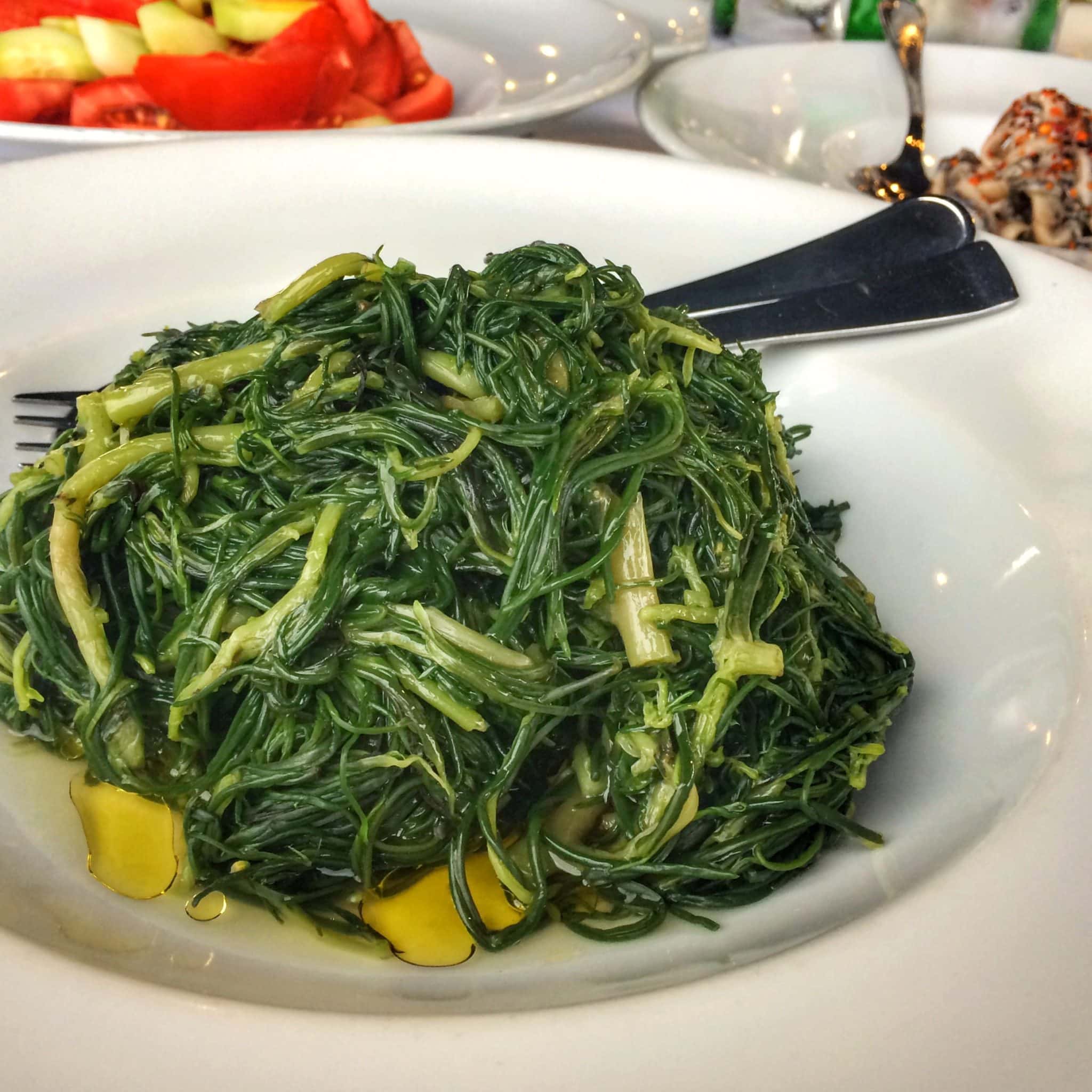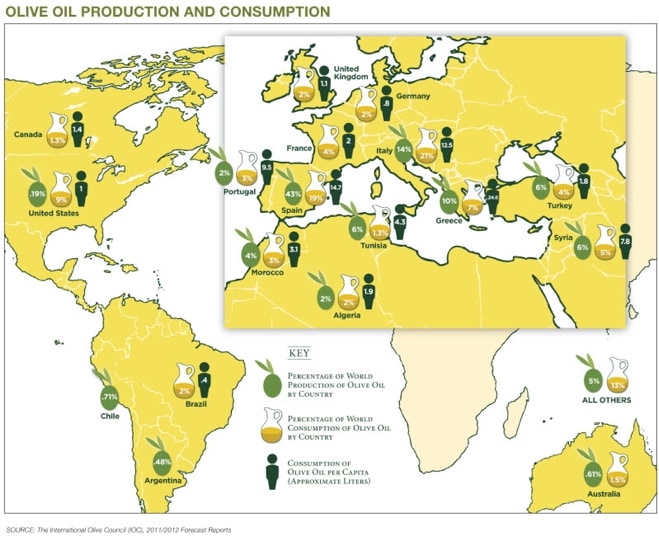The “Mediterranean Diet”, Not The Diet of The Mediterranean
 In many of my past presentations I have explained that the Greek diet has not been widely associated with the now popular and famous Mediterranean diet. And I think that’s a shame. This may be due to misinformation, but I think more so by the simple fact that Greece has not really promoted this information. But this also brings up the question of what entails a Mediterranean Diet? Does it include all the Mediterranean countries?
In many of my past presentations I have explained that the Greek diet has not been widely associated with the now popular and famous Mediterranean diet. And I think that’s a shame. This may be due to misinformation, but I think more so by the simple fact that Greece has not really promoted this information. But this also brings up the question of what entails a Mediterranean Diet? Does it include all the Mediterranean countries?
For the most part the media portrays the Mediterranean diet as a diet that comes from the Mediterranean region, but that is wrong and we will see why:
1. Not All Countries in The Mediterranean Use Olive Oil as The Main Source of Fat
If we look at the consumption of olive oil (see diagram below) we see that many countries surrounding the Mediterranean have a small consumption per person of olive oil, which leads to the question: how can you say you have a Mediterranean diet when you hardly consume olive oil which is the cornerstone of the diet? Well, you cannot. If you look at this diagram you will notice that in Morocco the average person consumes only 3 liters of olive oil a year (that is less than 2 teaspoons a day), while Algeria 1.9 and Turkey only 1.8 liters a year (about 1 teaspoon a day). Compare that to 24 liters a year in Greece (the highest in the world), 12.5 liters in Italy and 14.7 in Spain.
Many countries may feel that since they border the Mediterranean they can rightfully claim that they too have a Mediterranean diet. However, the issue here is that the term “Mediterranean diet” is misleading, as the diet was based mainly on the diet Crete, Greece and southern Italy and not the whole Mediterranean.
2. Research Does Not Include All The Mediterranean In Its Initial Description of the Mediterranean Diet.
When we look at the documentation for the development of the Mediterranean Diet Pyramid by WHO and Harvard researchers what we see is that the diet was based of the diet of Crete, the rest of Greece and Southern Italy circa 1960. Therefore we can safely say that it was not based on all of the Mediterranean, because quite simply not all of the Mediterranean eats this way in addition there is not much research on many other countries surrounding the Mediterranean apart from Greece, Italy Spain, why then the findings in specific countries would apply to more than a dozen other countries? One article has noted that Greeks consume the Mediterranean diet in its purest form. Others have noted that the Mediterranean diet was really the diet of Cretan men in the 60’s.
One may wonder, since this diet is called Mediterranean, it must include all Mediterranean countries, right? Many countries may feel that since they border the Mediterranean they can rightfully claim that they too have a Mediterranean diet. However, the issue here is that the term “Mediterranean diet” is misleading, as the diet was based mainly on the diet Crete, Greece and southern Italy and not the whole Mediterranean. Unfortunately, the term is now established, but it needs to be clarified what this term means. Not only for reasons of authenticity but also for health benefits. Following a mix and match diet of Mediterranean foods will not result in all those health benefits. In fact many researchers do not feel that the term Mediterranean diet should be used in scientific papers for that reason.
A more appropriate term for the wonderful food found around the mediterranean should be “Mediterranean Cuisine”, not mediterranean diet which means something else entirely.
Unfortunately for many years now food in Greece (and in Greek restaurants outside Greece) has either been the typical touristy Greek fare such as souvlaki, gyros, Greek salad etc. or lately more modernized versions of Greek dishes that lack authenticity and identity.
3. In Greece, the Mediterranean Diet was observed in the Whole Country-Not so in other Mediterranean Countries
Now it must be noted that in certain parts of Spain and Italy we also see the Mediterranean diet, but not all. For example in Northern Italy the diet is not what we would call Mediterranean, there is less use of olive oil and tomato and heavier use of butter, lard, cream etc. What is unique in Greece is the fact that as a whole, the diet is Mediterranean. While there are some areas that consume more meat or butter, generally the diet is based on olive oil and vegetables. Add to this the fact that at that time, Greeks fasted for over 180 days a year which meant no animal products such as meat, butter and cheese (exception was for seafood).
Having all this in mind, Greece and can be considered in many ways the home of the Mediterranean Diet. This is what I proposed in my presentation on Friday to an audience that included members of the Greek Tourism Board as well as the Association of Greek Tourist Enterprises. I want to make it clear that it is not the only location that the Mediterranean diet has been found, but it is considered the prototype of this popular diet and lifestyle.
In a panel that included representatives and personalities from the Greek gastronomy and tourism world, it was agreed upon that there needs to be an organized strategy at a country level.
Unfortunately for many years now food in Greece (and in Greek restaurants outside Greece) has either been the typical touristy Greek fare such as souvlaki, gyros, Greek salad etc. or lately more modernized versions of Greek dishes that lack authenticity and identity.
Promotion of the variety and locality that Greek cuisine has, and its special relationship to the Mediterranean diet has been lacking. There have been some initiatives but they are sporadic.
My philosophy has always been NOT to try to make Greek food and cuisine something that it is not, but embrace its simplicity, seasonality, locality and clean flavors.
What is your experience with Greek food in Greece but also outside of Greece? Do you associate the Greek diet with the Mediterranean diet?



I’m very interested in Mediterranean Diet since few years, when I come for the first time in Crete. And yes, I associated all the time the Medittterranean Diet with Cretan Diet and Greek Diet, but never with other mediterranean country diets.
This is so true. I always lose weight when vacationing in Greece, and I do not diet while I’m there. The real traditional cuisine cooked by my family or experienced at local restaurants is full of fresh ingredients, vegetables and happy heaping helpings of olive oil..the greener the better!!
Thank you for sharing Tanya. You are lucky to have home cooked meals in Greece.
I have written a very comprehensive cookery book called “Traditional Greek Cooking, the food and wines of Greece”. It is written in English. I have received compliments from both Greeks and non-Greeks about the selection and execution of the most representative dishes that can be called authentic. The book is available from the Amazon.
George Moudiotis
I am very interested in Greek food and came across this blog post when looking for some of . Mr. Moudiotis’ recipes. I would really like to recommend this book as my Greek friends tell me,has secrets for the finest traditional Greek dishes. I love this Blog, have made some soup recipes and some delicious cookie recipes. I am a bit of a collector of Greek cookbooks, have quite a few and am now on my way to Amazon to order this one!
I was born and live in Australia and my parents are Greek from Cyprus.
I am 30 years old and when my husband and I moved into our home, I wanted to find traditional Greek recipes that I could learn to cook at home as our lifestyle these days consists of eating out AT LEAST 3 out of 7 days so I wanted to keep home cooking simple and healthy and the Greek traditional dishes always came to mind as being the healthiest. So I try and cook lentil soup (fakes) or lentil rice as we make it in Cyprus, beans (but instead of making it the traditional way, I make it into a salad and add tuna and dress it with lemon and olive oil) its our western twist to a traditional dish. I also make fasolakia and might add chicken breast to it if we feel like meat otherwise we keep it vegetarian. In a society in which meat is everywhere, we often try to avoid eating too much meat at home. I have grown up with that mentality that meat should not be eaten every day and this is something that the Mediterranean diet also promotes.
When we visit Cyprus or Greece, we try to keep it traditional and we go to the local tavernas and enjoy as much of the traditional dishes that we can and what is great is that it includes mezedes of rich food such as moussaka, pastisio, but always accompanied with a Greek (horiatiki) salad, chicory (horta) etc.
In Sydney at the moment, Greek street food such as yeros and souvlakia in a pita have really taken off and a number of take-away food stores have opened all around Sydney – its the current craze here. As tasty as it is, we know it does not represent the actual Greek diet, but its great to have every now and then.
Thank you for sharing Katherine! You are so right about the meat. And it is also unfortunately very prominent on Greece too, the past 20-30 years, meat consumption has increased greatly.
Well, from a “touristy” standpoint, most of the food we hear about as Greek is not originally so. Greek yogurt is Arabic labneh, Gyros is Turkish Doner Kebab, philo dough was invented in Istanbul, so is baklava, moussaka is an Arabic name and dish meaning “chilled”, same for Greek coffee, and the list goes on and on (kofta, kebab etc…) Most are called Greek by marketing practices to weterners, and by the patriotism of Greek immigrants.
From the historical standpoint, i wonder why you defined the mediterranean diet as that of Crete and soutgern Italy in the 60s? And also, i dont know why you define it with olive oil (and tomatoes), especially that olive oil was invented in Syria over 3000 years ago, and tomatoes originate in Meso-America.
Dear Nas,
The Mediterranean diet is a pattern of eating associated with certain health benefits, please do not confuse it with Mediterranean cuisine. I did not define it as the diet of Crete, Greece and Southern Italy, researchers have defined it as that, I have provided links to the scientific documentation in the article.
I’m so glad you’re feeling better! Thanks for all the excellent information & recipes.
Thanks Susan!
Glykeia mou I’m so happy you feel better and sorry you were so sick.
PERASTIKA SOY KAI POTE PALI!!!
Filakiaxxxxxx
Stayed on the Island of Andros with a friend’s family in the village of Korthiou. The most amazing home cooked food…I even had the honor of making the homemade fried potatoes. It’s so true…vegetables are the main dish. I want to go back to that kind of diet…I felt so good while I was there…and thats what brought me to your website. I’m so looking forward to seeing whats on it….thats all I thought about at work today. Have a great week and I’m going Greek food shopping tomorrow…I wished I lived in Astoria NY!!! LOL
Thank you for sharing Nancy! Enjoy shopping.